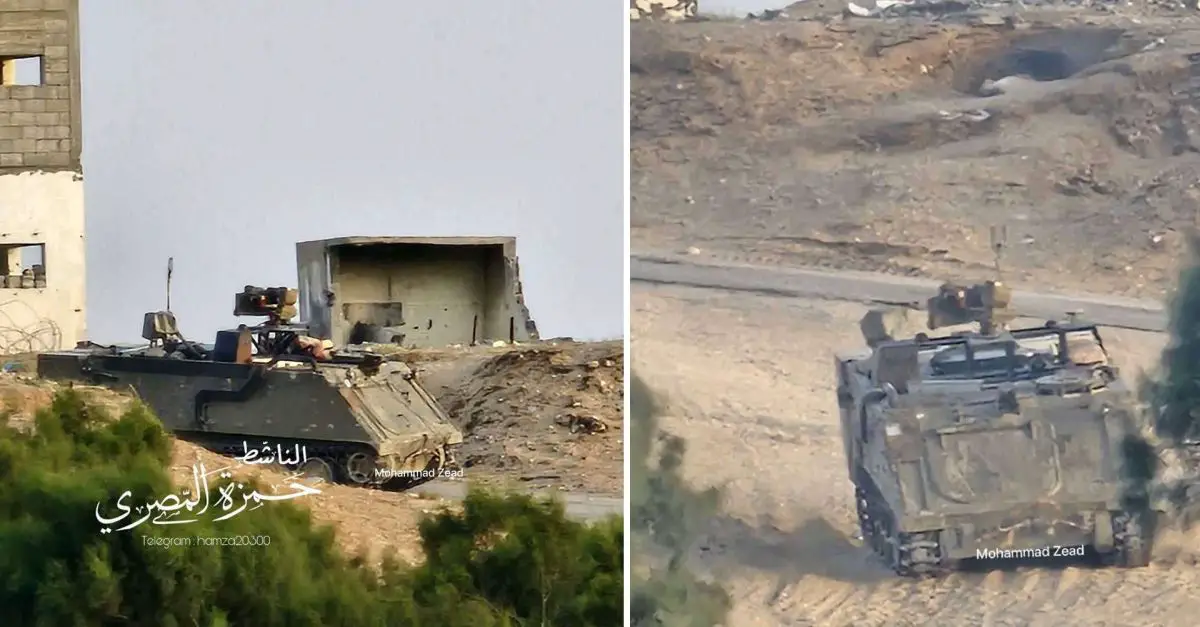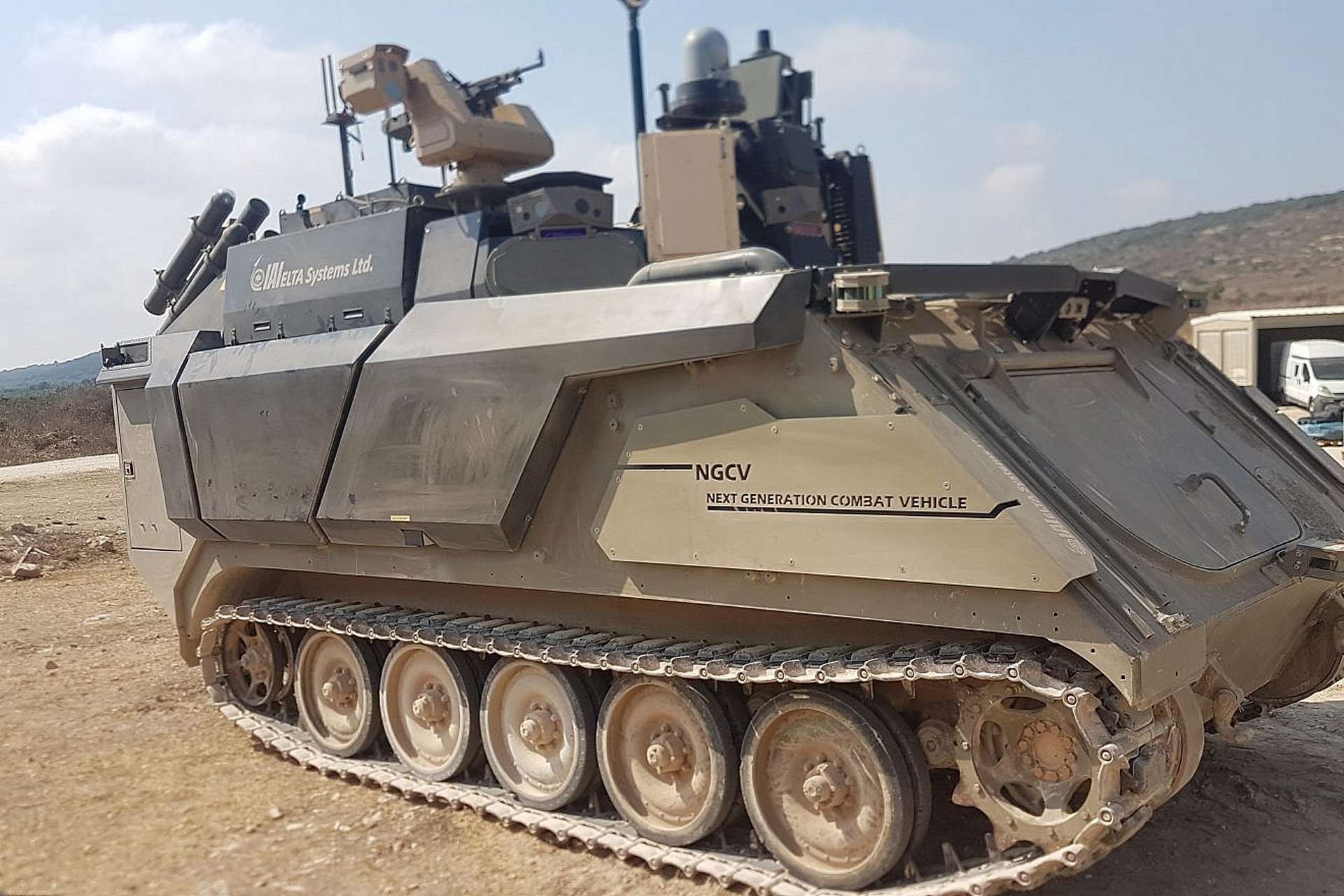Breaking news
Did the Israeli Defense Forces send remote-controlled M113 Zelda APCs to Rafah?.
According to information from the Twitter account Gaza War Unit Tracker on May 27, 2024, the Israeli Defense Forces (IDF) could have deployed unmanned M113 "Zelda" armored personnel carriers (APCs) in Rafah. Noting their reported presence on Zaruub Hill, these remotely controlled vehicles are said to be equipped with remote-controlled weapons and can carry up to four tons of payload. This information may be plausible, given the IDF's previous known use and development of unmanned vehicles.
Follow Army Recognition on Google News at this link

These images are reportedly showing the deployment of remote-controlled M113 armored personnel carriers (APCs) in Rafah by the Israeli Defense Forces in May 2024. (Picture source: Twitter/Gaza War Unit Tracker)
Videos and accompanying photos purportedly showed the M113, considered an obsolete and vulnerable platform, moving slowly in semi-urban terrain. Comments on the social media platform X, formerly known as Twitter, suggested that these unmanned APCs have played a key role in the battle for the Philadelphi corridor in Rafah, a strategic area running along the border of Gaza and Egypt that served as a resupply line for Hamas. The unmanned APCs have reportedly been used to move further west along the corridor, extending operations towards the sea.
This unverified use of these unmanned vehicles could address the vulnerabilities of manned APCs like the M113, which has aluminum armor that provides limited protection against small arms and is ineffective against RPG rockets and heavy machine gun fire. Historical incidents highlighting these vulnerabilities include the deaths of five engineering soldiers in May 2004 when a Zelda APC loaded with explosives exploded on the Philadelphia route near the Egyptian border, and another incident where six soldiers were killed in the Zeytun neighborhood. During Operation Tzuk Eitan in 2014, seven soldiers were killed when a Zelda APC got stuck in the Sja'aiya neighborhood and was destroyed by RPG fire.
The M113 "Zelda" is an Israeli modification of the American M113 APC, adapted for the region’s hot climate. This vehicle can mount a 12.7 mm machine gun and four 7.62 mm machine guns. The unmanned version, created in 2014, is remotely controlled and can reach speeds of up to 50 km/h. It is designed to transport supplies to front-line positions and support various military tasks without endangering personnel.
The IDF has sought ways to repurpose the aging M113s, introduced in the 1960s, which are small, slow, and vulnerable to anti-armor weapons. Despite these limitations, they can fulfill various auxiliary roles, particularly in rear areas. Back in January, an Israeli media noted that some developed devices could enable armored vehicles to be operated by remote control. One such system, manufactured by several companies including Elbit, can be mounted on heavy vehicles like APCs, allowing them to be driven remotely, especially in terrorist-infested environments. It is not clear if this is related to the latest reports from Rafah.

In 2019, the Israeli Defense Forces (IDF) started the development of the M113-based Carmel armored fighting vehicle (AFV) program, which focused on the integration of advanced autonomous capabilities, artificial intelligence, and sophisticated sensors. (Picture source: JNS/Yaakov Lappin)
Since 2013, the IDF has been experimenting with remote-controlled M113 prototypes, and by February of this year, these vehicles were actively used in Gaza. They transport significant military equipment and other warfare necessities without endangering soldiers. In 2019, the Israeli Defense Forces (IDF) started the development of the M113-based Carmel armored fighting vehicle (AFV) program. Led by Israel Aerospace Industries (IAI), the program focuses on integrating advanced autonomous capabilities, artificial intelligence, and sophisticated sensors into combat vehicles. The goal is to create an agile, effective, and easy-to-maneuver vehicle with significantly enhanced operational capability. The Carmel AFV is designed to be operated by just two soldiers, thanks to its advanced "glass cockpit" system, which allows for closed-hatch operations and provides a 360-degree situational awareness using augmented reality.
The Carmel AFV utilizes a combination of autonomous systems and AI to handle various combat tasks, such as navigation, target detection, and threat analysis, thereby reducing the cognitive load on the crew. The vehicle’s autonomous capabilities are akin to those of unmanned aerial vehicles (UAVs) that have transformed air combat. The onboard AI, named Athena, uses data from multiple sensors to assist in real-time decision-making, route planning, and threat engagement. This approach is expected to revolutionize ground combat operations, much like UAVs have done for aerial combat, by enhancing situational awareness and operational efficiency while minimizing the risk to personnel.
The IDF's history of converting vehicles for unmanned operations extends beyond APCs. The Corps of Engineers has utilized remotely piloted D9 bulldozers, known as "Dawn Thunder," since the early 2000s. These bulldozers were first used in Gaza during Operation Cast Lead. Over the years, more advanced versions have been developed, including the "Panda," which was first operated in enemy territory during the Iron Swords War in 2017. Similarly, Robattle is a versatile engineering vehicle that can adjust its size and capabilities based on mission requirements, enhancing its maneuverability and operational efficiency in various environments.
The Guardium series of UGVs, including the Guardium MK III and Avantguard MK II, further exemplify the IDF's advancements in this area. These vehicles are designed for reconnaissance and weapon operation without exposing personnel to danger. The Guardium MK III is fully autonomous, aimed at responding to threats and performing missions in hostile areas. Additionally, the IDF has deployed the Border Patroller, a UGV based on the Ford F-350 Super Duty Truck, for surveillance and patrol duties along the Gaza border.

























